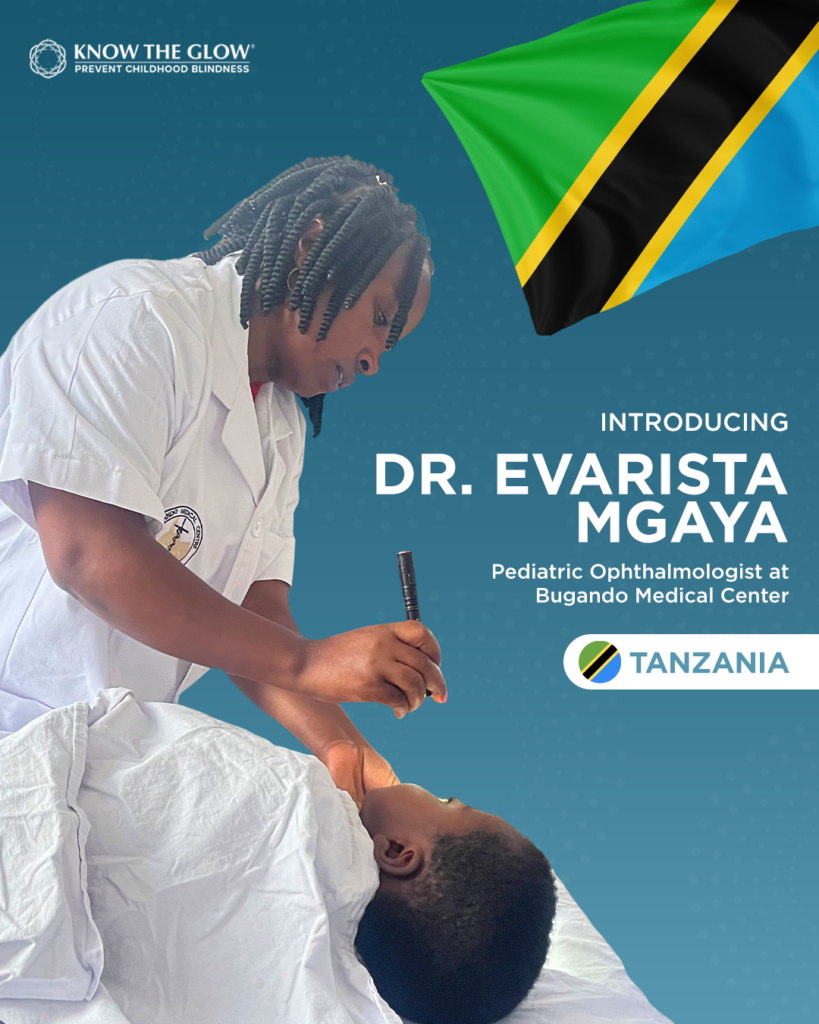Dr. Evarista Mgaya, a dedicated pediatric ophthalmologist at Bugando Medical Center in Tanzania, recently spoke with the KnowTheGlow team, including Co-Founder Megan Webber, who had the good fortune of meeting the amazing Dr. Mgaya initially at the ISOO Conference in Mombasa in 2023. Also on the call were Director of Global Outreach Helene Dameris, and Africa Program Manager Ruth Ngaruiya. Dr. Mgaya offered a powerful glimpse into both the progress and the persistent challenges surrounding retinoblastoma care in Tanzania.
Her journey into pediatric eye care began in 2010 when she was a young general practitioner at Bugando. A chance to work with an experienced and inspirational ophthalmologist sparked an interest that quickly grew into a calling. Motivated by the number of children being referred far away for treatment and often lost to follow-up as she pursued ophthalmology training in Kilimanjaro(2011-2015) and later specialized further in pediatric care. In 2018, a grant from The Late QUEEN ELIZABETH DIAMOND JUBILLEE through London school of Tropical medicine enabled her to train in India, and by 2019 she returned with new skills to Bugando Medical Center.
The Bugando Medical Center has seen remarkable changes in recent years. Previously lacking essential services such as MRI scans, chemotherapy, and cryotherapy, the hospital is now equipped with two CT scanners, an MRI machine, and stronger diagnostic capabilities. Families have benefited from a hostel(supported by ICCARE that provides free accommodation and transport to and from the hospital. The Desk and Chair Foundation located in Mwanza occasionally supports families facing acute financial distress, while the Lions Club, particularly its German chapter, helped establish the Ophthalmology building with clinic, wards and theaters between 2020 and 2023.
One of the most impactful tools incorporated in recent years has been the ArcLight ophthalmoscope. Though her junior colleagues are still in training, they have learned to use the device effectively and are now passing this knowledge on to community members in rural areas. Early detection has improved as a result. In one case recently, a child presenting with leukocoria was referred in time and is now receiving treatment for Group B and C staged disease. It shows the power of new tools in the hands of trained and ready personnel. On the academic side, each year, Dr. Mgaya emphasizes to her students the importance of never leaving the ophthalmology department without understanding the red reflex and The Glow, urging them to take at least that one critical message home.
Despite these advances, challenges remain. Dr. Mgaya spoke about the painful decisions some families make to pursue traditional or spiritual healing instead of medical treatment. She recalled one case where a child was withdrawn from chemotherapy after just one cycle and returned months later with advanced metastasis. At the same time, she has also seen growing trust in medical care. Families are now presenting earlier than before, which she attributes to consistent and growing awareness campaigns and regular media broadcasts especially during pediatric cancer awareness months and during outreach.
Collaborative efforts have helped to accelerate change. A grant from St. Jude and Duke University that is supporting community outreach across Tanzania’s Lake Zone, brought training and educational materials to areas with high rates of late presentation. The project is expected to run through December 2025 and is supported locally by pediatric oncologist Dr. Heronima Joas. Dr. Mgaya also noted ongoing conversations with government partners to develop national treatment guidelines for pediatric eye conditions. A fundraising marathon planned for 3 August 2025 will further support children with cancer receiving care at Bugando.
Beyond her clinical work, she provides emotional support to families, drawing from her own experience as a mother of two. Her empathy, combined with her expertise and determination, continues to shape the future of childhood eye cancer care in Tanzania.Looking ahead, Dr. Mgaya remains hopeful. Research into treatments such as Topotecan and Dr. Jesse Berry’s aqueous humor study also offer new possibilities for diagnosis and monitoring. With continued awareness, utilization of materials from current partners and organizations like Know The Glow, and increased investment in local capacity, she believes more children in Tanzania will receive the timely, life-saving care they need.

